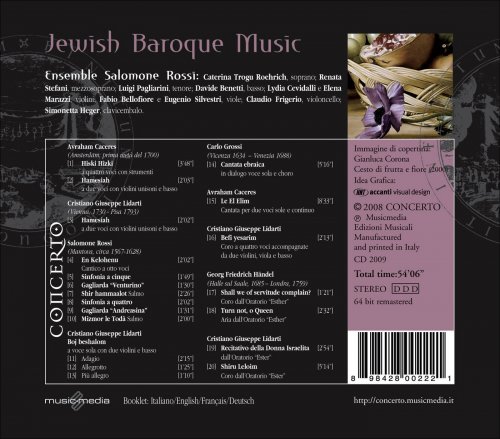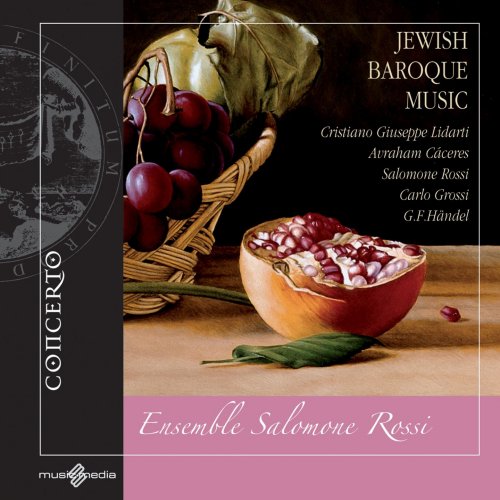
Ensemble Salomone Rossi - Jewish Baroque Music (2008)
BAND/ARTIST: Ensemble Salomone Rossi
- Title: Jewish Baroque Music
- Year Of Release: 2008
- Label: Concerto Classics
- Genre: Classical
- Quality: flac lossless (tracks) +Booklet
- Total Time: 00:54:28
- Total Size: 291 mb
- WebSite: Album Preview
Tracklist
01. Hiski Hizki
02. Hamesiach Ilemim
03. Hamesiah
04. En Kelohenu
05. Sinfonia a 5
06. Gagliarda: “Venturino”
07. Shir Hammaalot
08. Sinfonia a 4
09. Gagliarda: “Andreasina”
10. Mizmor le Todà
11. Boj beshalom: I. Adagio
12. Boj beshalom: II. Allegrotto
13. Boj beshalom: III. Più allegro
14. Cantata Ebraica in Dialogo
15. Le El Elim
16. Befi Yesarim
17. Esther, HWV 50b, Act I, Scene 8: "Shall we of servitude complain?"
18. Esther, HWV 50b, Act III, Scene 31: "Turn not, O Queen"
19. Ester: "Recitativo della Donna Israelita"
20. Ester: "Shiru Leloim"

From the Seventeenth Century onwards Jewish cultural life has produced multifarious examples of musical practices based on non-Jewish models, such as the adoption of vocal and instrumental polyphony, but introduced at the same time into a decidedly Jewish context. These practices always have two elements in common: firstly all the pieces which have come down to us have direct reference to Jewish life; holidays, circumcisions, anniversaries, important events are celebrated by pieces of music commissioned by the Jewish communities to composers of various origin. Secondly it is clearly evident that these pieces are based on stylistic elements identical with those on which the music of the surrounding non-Jewish world is based. From which we may draw an important conclusion, namely the direct correspondence between the use of the foreign musical language and the process of adoption on the part of Jews, in those areas in which tolerance towards Jews was greatest, of the culture of the Renaissance and Baroque world. This process had its beginning in Italy itself, thanks to the work of Salomone Rossi and to Leone da Modena's theoretical approach.
01. Hiski Hizki
02. Hamesiach Ilemim
03. Hamesiah
04. En Kelohenu
05. Sinfonia a 5
06. Gagliarda: “Venturino”
07. Shir Hammaalot
08. Sinfonia a 4
09. Gagliarda: “Andreasina”
10. Mizmor le Todà
11. Boj beshalom: I. Adagio
12. Boj beshalom: II. Allegrotto
13. Boj beshalom: III. Più allegro
14. Cantata Ebraica in Dialogo
15. Le El Elim
16. Befi Yesarim
17. Esther, HWV 50b, Act I, Scene 8: "Shall we of servitude complain?"
18. Esther, HWV 50b, Act III, Scene 31: "Turn not, O Queen"
19. Ester: "Recitativo della Donna Israelita"
20. Ester: "Shiru Leloim"

From the Seventeenth Century onwards Jewish cultural life has produced multifarious examples of musical practices based on non-Jewish models, such as the adoption of vocal and instrumental polyphony, but introduced at the same time into a decidedly Jewish context. These practices always have two elements in common: firstly all the pieces which have come down to us have direct reference to Jewish life; holidays, circumcisions, anniversaries, important events are celebrated by pieces of music commissioned by the Jewish communities to composers of various origin. Secondly it is clearly evident that these pieces are based on stylistic elements identical with those on which the music of the surrounding non-Jewish world is based. From which we may draw an important conclusion, namely the direct correspondence between the use of the foreign musical language and the process of adoption on the part of Jews, in those areas in which tolerance towards Jews was greatest, of the culture of the Renaissance and Baroque world. This process had its beginning in Italy itself, thanks to the work of Salomone Rossi and to Leone da Modena's theoretical approach.
As a ISRA.CLOUD's PREMIUM member you will have the following benefits:
- Unlimited high speed downloads
- Download directly without waiting time
- Unlimited parallel downloads
- Support for download accelerators
- No advertising
- Resume broken downloads


